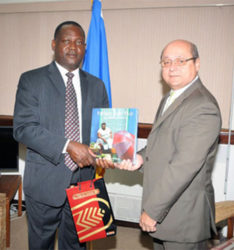One of Caricom’s most conservative member countries has taken its place in the queue to benefit from the emerging economic opportunities that are thought likely to arise out of the re-establishment of diplomatic relations between Havana and Washington.
Recently, the Barbados Government used the opportunity of a courtesy call on its Industry Minister Donville Innis by Cuba’s resident Ambassador in Bridgetown Franscisco Fernandez Pena to express its desire to “forge deeper economic ties with Cuba” which, translated from the diplomatic jargon in which the pronouncement is couched, means, according to a report in a section of the Barbados media, engaging “robustly in trade.” The Barbados Government has already disclosed that several local companies are apparently queuing up to do business with the Caribbean island once considered to be an ideological pariah. Indeed, it has been confirmed that as of May this year Banks Breweries would be moving to export up to 1 million cases of beer to Cuba. A trade mission is currently being assembled in Barbados to visit Cuba.
Barbados and the rest of Caricom for that matter are likely to find the administration in Havana mindful of further strengthening ties that have formally been in place since 1972 when Jamaica, Guyana, Trinidad and Tobago and Barbados led the way in the region by establishing diplomatic relations with Cuba.
The commencement of formal ties between Cuba and the so-called big four in Caricom marked the start of a successful relationship between Cuba and the English-speaking Caribbean characterized by technical cooperation notably in the field of education and through which Cuba provided medical training for thousands of scholars from across the Caribbean.

Simultaneously, and intermittent periods of US diplomatic pressure notwithstanding, Caricom countries kept faith with Cuba in a relationship characterized by a universal acknowledgement across the region that ideological differences aside Cuba, unquestionably, was part of the Caribbean family.
The presence of Cuban medical personnel in several Caribbean countries and more recently the removal of restrictions that allowed for mainly official visits by Cubans to the English-speaking Caribbean made even clearer the growing closeness between Cuba and the rest of the Caribbean.
The challenge for the Caribbean, though, is that Cuba has other long-standing allies both within and without the region to say nothing of eagle-eyed entrepreneurs in the United States who have already begun to probe such business opportunities in a country which is clearly eager to experience a full-fledged economic connection with the west. That would mean that Caricom countries might have to take their place in the queue.
But it will not be simply a question of simply waiting one’s turn.
The months and years ahead are likely to witness both a reconfiguration and a strengthening of the various Caricom diplomatic missions in Havana to reflect a greater shifting of interests to the economic sphere. In essence, Caricom countries, both individually and as a regional grouping must begin to contemplate the beginning of an era of full-fledged economic diplomacy with Havana.




